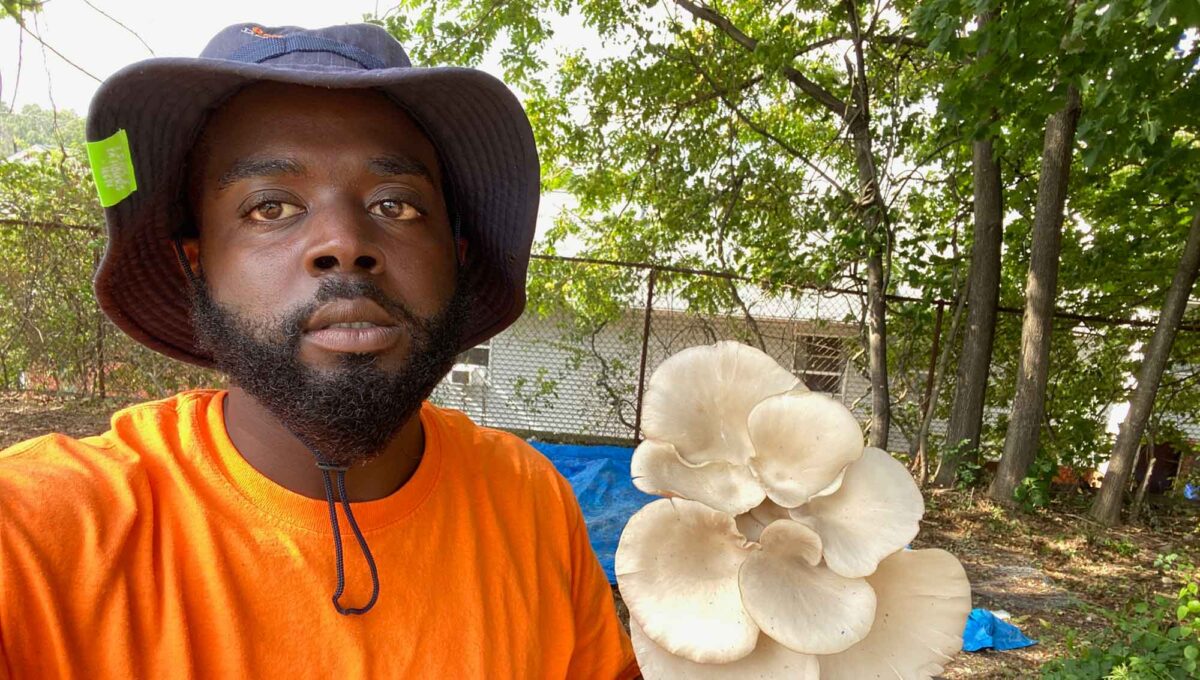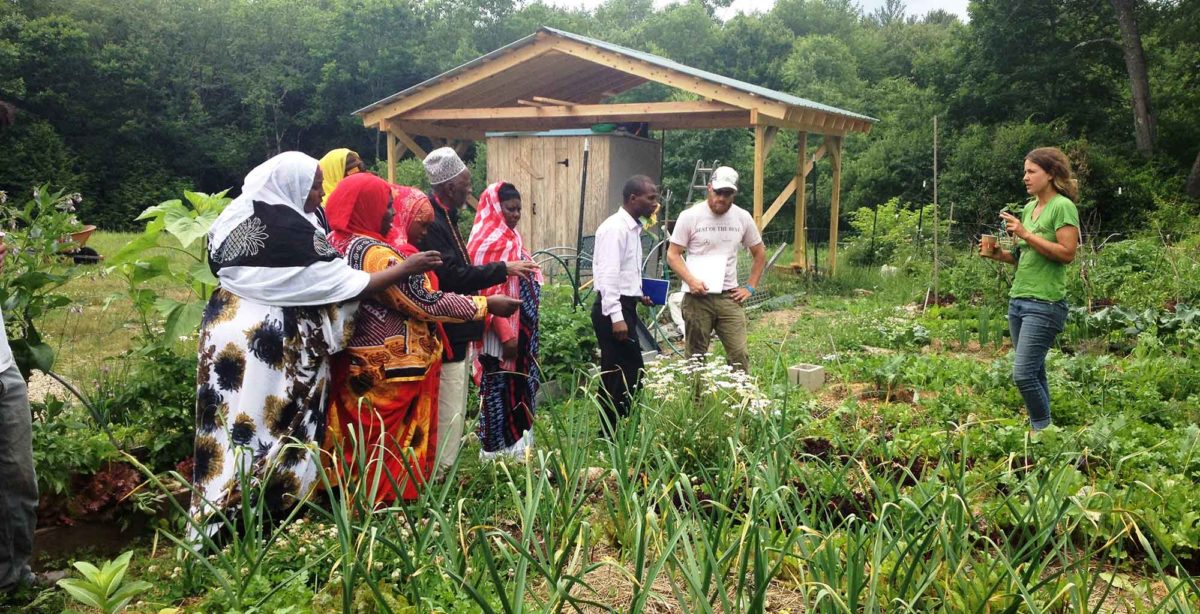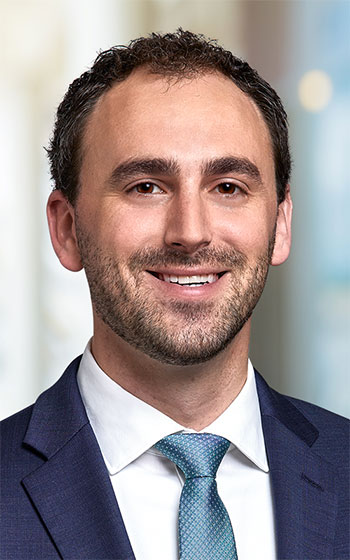In 2015, Robert Peck led a trip to work on urban farms as part of an Americorps volunteer group.
While building garden beds in southern cities, Peck’s eyes opened to new possibilities: If healthy local produce could be grown in the hearts of Memphis and Tallahassee, why not in his hometown of Bridgeport, Connecticut?
Inspired, Peck returned home and started a 40-square-foot vegetable garden in his mother’s yard. Eventually, that seed of an idea sprouted into Hemp Milk & Honey, a “community shared agriculture” enterprise in which people can subscribe to get boxes of fresh veggies from Peck’s gardens, now scattered about the city. Peck, who calls himself the “Hood farmer,” hopes to address what he calls Bridgeport’s “food apartheid,” a divide that leaves certain sections of the city devoid of fresh fruits and vegetables.
When Peck needed an expert pair of eyes to review a lease for his continued expansion, he decided to try out a resource he’d heard about through the farming grapevine: CLF’s Legal Food Hub, which matches small-scale farmers and food businesses with volunteer attorneys who provide legal advice for free.

A Helping Hand for Local Farmers
Peck is one of hundreds of farmers and food entrepreneurs who have sought help through the Legal Food Hub since it launched in 2014. CLF created the Hub after realizing that only 10% of farmers use legal services, compared to 70% of small businesses in general. That leaves many farmers vulnerable when it comes to navigating the business complexities of running their farms, including incorporating, hiring help, drawing up employee contracts, leasing land, or transferring a farm to heirs. Many of these small business owners know they need legal help but can’t afford it. Others try going it alone. Many never realize they need help at all – until it’s too late.
“CLF believes a thriving New England means a thriving local food system,” says Mary Lovell Egan, senior program coordinator for the Legal Food Hub. “But we can’t achieve that if our small farmers and food business are left vulnerable legally.” The idea is this: We can fortify a robust regional food system by providing small food entrepreneurs and farmers with legal assistance they might not otherwise be able to afford.
“The Legal Food Hub helps these food businesses move beyond costly legal needs so they can focus on growing, thriving, and providing for the community,” says Egan. In turn, New Englanders get access to more high-quality fresh foods that are locally grown. And the local food economy thrives as a result.
Since its inception in Massachusetts, the Hub has expanded to serve farmers and food businesses in every New England state. Over the years, the Hub has assisted farmers 511 times, food entrepreneurs 213 times, and food-related nonprofit groups 281 times. The Hub now draws on a network of volunteer lawyers from 158 law firms across the region. Although most cases are relatively simple, there have been some more complicated ones, including the real estate legal work behind the Boston Public Market, which opened in downtown Boston in 2015. Peck’s Hemp Milk & Honey set a new milestone for the Hub – its 1,000th case.

Advice That Helps Farmers and Food Businesses Grow
“It’s been pretty invaluable,” says Peck of the free legal assistance he has received through the Hub. He was matched with attorney Tyler Archer of Shipman & Goodwin LLP in Hartford. Archer combed through a lease for a plot of land outside Bridgeport, where Peck plans to grow an expanded selection of vegetables and a variety of mushrooms. The work was done just in time for Peck’s first growing season as a CSA.

“The lease that we were looking at initially looked good to the naked eye,” says Peck. “But once you get someone who has the background and the wherewithal to give insight to what you’re looking at, well, it was super helpful.”
It’s a sentiment Egan has heard repeatedly from farmers and food businesses participating in the Legal Food Hub. But the experience isn’t meaningful to those receiving free legal advice – it’s also a boon for those dispensing that advice. “It’s not that a business owner can’t negotiate a good contract alone,” reflects Archer, who joined the Legal Food Hub network in 2022. “But in the end, adding a lawyer to the team brings in a new perspective and can take some of the pressure off, allowing the focus to be on growing the business.”
Archer decided to volunteer because his firm already had a deep roster of larger food and agricultural clients. Working with the Hub, he says, allows him to “stay local and support those smaller producers working to feed our communities.”
Boosting the Region’s Economy While Fighting Climate Change
Although every participant and volunteer is vitally important at the Hub, the overarching mission runs deeper than any single legal case. The reality is that New Englanders import about 90% of the food we buy in traditional grocery stores. And the current system of industrialized food production fueling that imported supply degrades the environment and climate, says Scott Sanderson, manager of CLF’s Food and Farm Initiative. The Legal Food Hub is one way of protecting small farmers who are committed to growing food more sustainably.
“We have to both boost our ability to produce our own food in New England and then make sure that as we do that, we don’t reproduce the harms embodied in a lot of the food that we’re importing,” he says.
1,000 Cases Are Just the Beginning
The Legal Food Hub’s 1,000 cases to date are a healthy start toward achieving that larger goal. So are the comprehensive online resource library and free webinars the Hub offers, which reach a wider audience than those that qualify directly for the Hub’s free legal services.
In the end, the Hub has proven itself instrumental for small start-ups like Hemp Milk & Honey that have been able to use its services to advance their own goals in their own communities.
“[Local food] is just a way that really gets the community involved with what’s going on,” reflects Peck. “The more people that are getting connected to local farmers, the healthier we are locally as a community.”
Read more stories of farmers and food businesses that the Legal Food Hub has helped.
